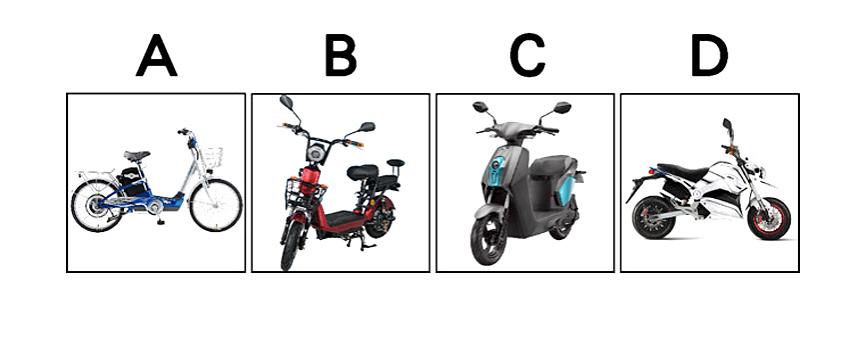The government should crack down on illegal electric bicycles and scooters, the non-profit Consumers’ Foundation said on Friday, citing research on the potentially dangerous speed of the vehicles.
Electric bicycles and lightweight electric scooters have gained popularity as they do not require registration and riders do not need licenses, the foundation said, adding that as many as 40 percent of them can reach speeds exceeding the legal limit of 25kph for non-licensed two-wheelers.
Some consumers also purchased legal electric vehicles and modified them to reach higher speeds, it said.

Photo provided by the Consumers’ Foundation
“If the government does not step up efforts to confiscate these illegal electric vehicles, they could become a danger to consumers’ personal safety,” the foundation said.
In a spot check last month of 12 vehicles sold on auction Web sites and online retail platforms, the foundation found that five of the vehicles reached speeds exceeding the legal limit, it said.
Two of them reached 60kph, similar to fuel-powered motorcycles with engines between 50cc and 250cc that require white license plates, it said.
The foundation also found numerous video tutorials and online articles on the modification of electric bicycles, for example to remove factory-installed speed limiters, it said, adding that a traffic accident with a modified vehicle might be fatal.
Under stipulations of the Road Traffic Management and Penalty Act (道路交通管理處罰條例), people who exceed the 25kph speed limit can be fined between NT$900 and NT$1,800.
The number of accidents involving electric bicycles and lightweight electric scooters in 2018 almost doubled from 2014, but police were still at odds over how to handle traffic violations involving the vehicles, which occupy a “fuzzy space” between bicycle regulations and regulations for heavier two-wheelers.
However, as the vehicles pose an alternative for those without a license or those who are attracted by their low cost — such as elderly people, young people and migrant workers — there is a pressing need for the introduction of clear regulations, the foundation said.
For example, the government could introduce insurance or license requirements that include a written test, as known from regular motorcycle license tests, it said.
This would ensure that riders are familiar with traffic rules, the foundation said, adding that the government must also hold retailers accountable for informing people about the dangers posed by the vehicles, especially if modified, and the importance of sticking to the traffic rules.

Chinese Nationalist Party (KMT) Chairman Eric Chu (朱立倫), spokeswoman Yang Chih-yu (楊智伃) and Legislator Hsieh Lung-chieh (謝龍介) would be summoned by police for questioning for leading an illegal assembly on Thursday evening last week, Minister of the Interior Liu Shyh-fang (劉世芳) said today. The three KMT officials led an assembly outside the Taipei City Prosecutors’ Office, a restricted area where public assembly is not allowed, protesting the questioning of several KMT staff and searches of KMT headquarters and offices in a recall petition forgery case. Chu, Yang and Hsieh are all suspected of contravening the Assembly and Parade Act (集會遊行法) by holding

PRAISE: Japanese visitor Takashi Kubota said the Taiwanese temple architecture images showcased in the AI Art Gallery were the most impressive displays he saw Taiwan does not have an official pavilion at the World Expo in Osaka, Japan, because of its diplomatic predicament, but the government-backed Tech World pavilion is drawing interest with its unique recreations of works by Taiwanese artists. The pavilion features an artificial intelligence (AI)-based art gallery showcasing works of famous Taiwanese artists from the Japanese colonial period using innovative technologies. Among its main simulated displays are Eastern gouache paintings by Chen Chin (陳進), Lin Yu-shan (林玉山) and Kuo Hsueh-hu (郭雪湖), who were the three young Taiwanese painters selected for the East Asian Painting exhibition in 1927. Gouache is a water-based

Taiwan would welcome the return of Honduras as a diplomatic ally if its next president decides to make such a move, Minister of Foreign Affairs Lin Chia-lung (林佳龍) said yesterday. “Of course, we would welcome Honduras if they want to restore diplomatic ties with Taiwan after their elections,” Lin said at a meeting of the legislature’s Foreign Affairs and National Defense Committee, when asked to comment on statements made by two of the three Honduran presidential candidates during the presidential campaign in the Central American country. Taiwan is paying close attention to the region as a whole in the wake of a

OFF-TARGET: More than 30,000 participants were expected to take part in the Games next month, but only 6,550 foreign and 19,400 Taiwanese athletes have registered Taipei city councilors yesterday blasted the organizers of next month’s World Masters Games over sudden timetable and venue changes, which they said have caused thousands of participants to back out of the international sporting event, among other organizational issues. They also cited visa delays and political interference by China as reasons many foreign athletes are requesting refunds for the event, to be held from May 17 to 30. Jointly organized by the Taipei and New Taipei City governments, the games have been rocked by numerous controversies since preparations began in 2020. Taipei City Councilor Lin Yen-feng (林延鳳) said yesterday that new measures by